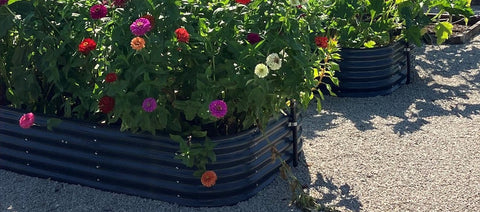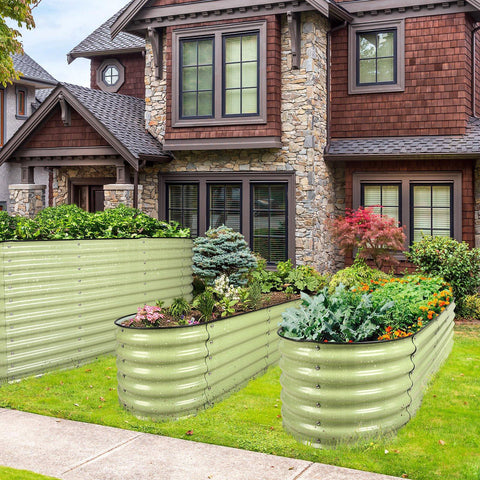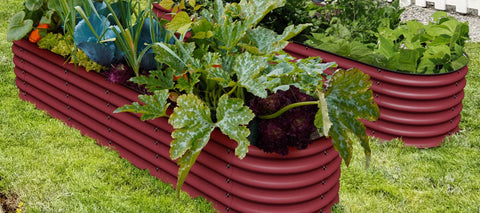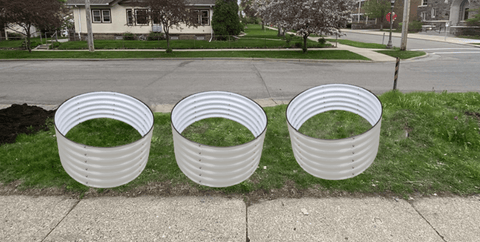Knowledge from Olle Garden Bed:Do plants like to be touched?
Human beings perceive the world through their own experience. It may help to understand others, but sometimes it may become an obstacle to living with pets and plants. For example, hugging others may be regarded as a comforting and friendly gesture, and stroking a dog or cat is a sign of love and affection. But how will plants react to the same action? Do plants even like to be touched? Facts have proved that being too sensitive to green pets will bring them pressure, and the plants in trouble are non productive plants. Dealing with plants and making them happy is much more complicated than people initially thought. Read here are some things that you should know when It comes to Olle Garden Beds!

Will touching plants affect them?
Touching plants affects them. Some species, such as many succulent plants, have a fine, dusty layer on their leaves. It is called "farina" and acts as a sunscreen to protect the leaves from sunburn. If you notice the farina on the plant leaves, please avoid touching them, because the oil on the human skin can easily remove this protective layer.
A good visual example of how plants respond to human touch is the mimosa response. This plant is also called "sensitive plant" or "shame plant". Once touched, these plants will close and reopen later. These closed movements are stress reactions that require plants to spend a lot of energy to protect themselves, rather than grow and obtain sweet leaves. If you repeat this feeling experiment every day, you will see a significant decline in the overall appearance and health of plants.
Do plants feel stress when they touch? Can it kill them?
Like people, plants may react differently to being touched. You can determine which plants do not mind hugging according to their nature and where they usually grow.
Indoor plants with broad leaves, such as tortoise shell bamboo, taro and botos, are occasionally wiped. This cleaning procedure helps to remove dust and monitor any pest activity. However, wipe the leaves very gently. Any contact, whether with hands, towels or other plants, will trigger the pressure reaction of plants.
These stress reactions usually involve the production and release of hormones and chemicals aimed at preventing herbivores or saving your plants from becoming snacks for some curious cats. The production of these chemicals requires a lot of energy, which can be supplemented by light cooperation. Your green pet will use the energy needed to grow or maintain existing leaves for protection.

Recent research shows that touching plants will change their genomes, reducing their growth by more than 30%. It is important to avoid unnecessary contact as much as possible to prevent your plants from being stressed.
More hardy plants such as fruit trees and vegetable plants can withstand more treatment planting, although too much vigorous exercise or excessive touch will damage the plants or reduce their overall growth. Over exposure to fruiting and flowering plants may hinder their growth. Fortunately, touching your plants won't kill them, but it's best to be careful and keep hugs to a minimum.
In a word, it is better to avoid hugging plants, no matter how the specimen is. Your green pet will thank you for richer and more prosperous growth and a longer and more productive life.
How do plants react to touching or touching each other?
For many plants, it is acceptable to touch gently to check whether there are pests on the plants, clean or trim them, move to a better location or re pot them in a larger container, but even they can cause some pressure.
Like humans, plants have stress hormones. To understand why green pets react so much to being touched, you must consider their natural habitat. In the wild, plants can only be touched when they become food for pests or animals. Therefore, any form of physical contact can trigger a stress response. Some plants may produce chemicals to stop herbivores, using valuable energy that can be used for growth or fruit/flower production.
When plants are close to each other and finally come into contact, one plant will benefit from this interaction, while another plant will be affected. Plants usually come into contact with irritants, such as light or objects needed for stem support. The tendrils are wound around the trellis to obtain support, or in some cases, around other plants, and their role is called "sulfur tropism". Unfortunately, this "plant hug" is usually fatal or at least harmful to one party. Plants seeking hugs will occupy the light, space and nutrition needed for healthy growth. Adequate spacing is essential to keep plants happy, because it can prevent green pets from hugging and keep their roots separated, which is very important for plants growing in a container.

Tips for plant layout to prevent mutual contact
If you grow many plants in a small space, some of them may occupy each other's space. This may be the cause of stunting and unhealthy appearance. Here are some measures you can take to arrange your plants and provide each plant with its own personal space:
Separate the plants. This is the most obvious solution, although it may not be suitable for everyone, especially those working in small spaces. If you have extra space, please separate each plant to avoid the contact of green pets. One advantage of spacing is that if a plant is infected by pests or diseases, it is unlikely to spread to other plants.
Play with height. Whether the space is small or not, you can use the height difference of plants to make better use of your space. Place the short plants under the higher plants and ensure that the leaves do not invade anyone's space. Dragging plants is easier because you can hang them on the shelf and let the leaves hang over the pot.
Let them climb up. Climbing plants, such as tortoiseshell bamboo and botos, can be trained to climb moss poles or walls, rather than other plants nearby.
If in doubt, trim it off. If you lack space and your plants are growing frantically, consider pruning them to provide more "breathing" space. This is a temporary repair, but if you like your plant's current size, you can continue to trim it regularly. Be careful not to over cut, because over cutting may lead to greater pressure.
Which plants like to be touched?
Although no plants like hugging, some plants can handle touch better than others. As mentioned earlier, broadleaf houseplants can benefit from gentle leaf cleaning, which helps remove dust. Wiping leaves helps plants to conduct photosynthesis more effectively, and can also remind you of any changes in plant health, such as pests or fungi.
Some good examples of plants that don't mind touching gently are jade plants, aloes and lily of peace.
Outdoor plants are more accustomed to contacting rain, wind or other "contact" pressure sources, which will inevitably occur when plants live outdoors. However, this does not mean that green pets like to be dealt with. Too much pressure brought by touch, whether it is rain or hands, or too close to other plants, usually leads to stress reaction. Planting large plants without proper spacing can damage some of them because they cannot get enough nutrition and sunlight.

Why do plants like to be touched? Why not?
Most plants prefer to establish a non-contact relationship with their owners, but it is inevitable to touch your green pets at some time and place. Now we have prepared a list of reasons to avoid touching plants, as well as some situations where you must provide gentle care:
Like:
clean. Gently wipe the dirt or dust accumulation on the leaves. Plants will eventually tolerate this process because it makes photosynthesis easier.
Trim. Although pruning can trigger stress response, the overall result is worth the pressure on plants. Avoid cutting plants too frequently to minimize stress and try to perform this process during the active growing season.
Hate:
Sunshine damage. Avoid touching succulent plants with powder coating. This coating can protect them from sunlight, once wiped off, they will not grow again, thus having a permanent impact on the overall health of plants. Leaves without this coating are more prone to sunburn, which may cause damage to the entire leaf, making them useless in generating energy for the rest of the plant.
Energy consumption. Do not touch insectivorous plants, such as Venus fly catcher, to induce closure. Like sensitive factories, closing and reopening require energy. For a plant that also consumes living insects, this energy is very valuable.
Sensitive or fragile leaves. Dryopteris maidenii and other plants with delicate leaves are vulnerable to skin oils. Avoid touching these plants as much as possible to ensure that you do not inadvertently hinder their growth.
